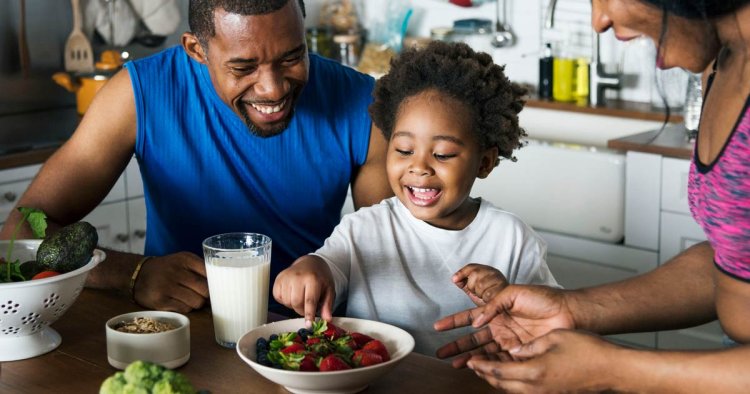Healthy Lifestyle Habits: Modeling and Encouraging Well-being

Introduction
Living a healthy lifestyle should be one of our top priorities in life. However, with our busy schedules and demanding jobs, it can often slip down our to-do list. Yet making small, sustainable changes to our daily habits can have significant long-term benefits to both our physical and mental well-being. As parents, we have a unique opportunity to model positive behaviors for our children and encourage them to develop healthy lifestyles from a young age. Establishing good habits early on allows them to grow up strong, energetic and mentally resilient.
In this article, I will explore some of the key healthy lifestyle habits that we can adopt and promote as a family, along with practical tips and suggestions. While it may seem daunting at first, maintaining wellness is all about making incremental improvements over time. If we lead by example and support each other along the journey, living well becomes an achievable and enjoyable goal for everyone. Let's get started on building healthy foundations for our loved ones!
Part 1: Physical Wellness Habits
Our physical health forms an important foundation for our overall well-being. Here are a few lifestyle practices we can cultivate to stay energetic and reduce disease risk:
- Eat Nutrient-Rich Foods
What we put on our plates has a huge influence on both our bodies and minds. Focusing on whole foods like fruits and vegetables, whole grains, lean proteins and healthy fats supplies our cells with crucial nutrients. These nourishing foods provide long-lasting energy and mental clarity compared to empty calories from processed junk. - As parents, we must set a good example by cooking balanced, homemade meals when possible. Get kids involved too by letting them help prepare simple dishes. This developing cooking and life skills while encouraging them to enjoy healthier options. Make mealtimes relaxed and quality family time instead of rushing through them. Growing up seeing nutritious diets modeled in a positive light lays the basis for kids developing lifelong healthy eating habits.
- Stay Hydrated
Drinking enough water every day is fundamental to wellness yet often neglected. Proper hydration benefits our organs, digestive system, cognitive abilities and more. Carry reusable water bottles and sip throughout the day—you can even turn it into a healthy competition within the family to reach your daily water intake goals. Flavor water naturally with fruit slices to make it interesting for children. Staying hydrated as a household habit reinforces its importance. - Move Your Body Regularly
Exercise brings numerous physical and mental benefits when done consistently, even if just starting out with light activity. Take the pressure off with family-friendly workouts like evening walks together, backyard games or indoor dance parties. As kids get older, enrolling them in fun sports or classes is a great motivator. Displaying an active lifestyle will rub off over time as recreation instead of a chore. Focus on activities everyone enjoys for long-term participation. - Prioritize Quality Sleep
Quality sleep is essential to recharge our bodies and minds each night yet often underestimated. Early bedtimes allow growing kids to get optimum rest for development. Reduce screen time before bed, establish relaxing routines and keep bedrooms conducive to sleep. Make getting sufficient rest a non-negotiable priority by setting a lead with your own sleep schedule. Proper sleep will boost every family member's energy, mood, memory and overall performance throughout the day.
Part 2: Mental Wellness Habits
Just as important as physical health is nurturing strong mental wellness. Developing resilience from a young age sets kids up for lifelong emotional health:
- Express Gratitude Daily
Cultivating an attitude of gratitude has been shown to reduce stress and boost happiness. Incorporate thankfulness into your family's daily conversations by going around the dinner table sharing what you're grateful for that day, big or small. Writing gratitude letters together works too. Even amid tough times, gratitude encourages focusing on life's blessings. Praising kids sincerely for good behavior and efforts develops their self-esteem. - Manage Stress in Healthy Ways
We all experience stress at times. Model constructive stress management like deep breathing, meditation, relaxation exercises or brisk walks outside in nature. Shut off devices occasionally for quiet family time doing relaxing activities like reading, crafts or board games together. Assure kids it's ok to feel overwhelmed sometimes but you'll work through it positively. Early emotional intelligence equips them with lifelong coping skills. - Connect With Others
Social interaction and community improve mental well-being. Prioritize quality time with loved ones, whether extended family, neighbors or friends. Get out for regular playdates in safe environments for children to form connections. Attend child-friendly community events together. As parents, carve out time for your own relationships too for balanced self-care. Socialization encourages children's emotional intelligence development. - Practice Mindful Activities
Activities requiring focus like arts/crafts, music, gardening or cooking help relax our minds from daily stresses. Children especially benefit cognitively and emotionally from "flow" experiences where they lose track of time absorbed in an engaging project or hobby. Having beginner kits and materials on hand opens opportunities for mindfulness that kids may carry into adulthood. Your own participation shows mindful habits benefit people of all ages.
Part 3: Family Wellness Habits
Bringing your entire household together in supporting wellness yields the greatest results. Try implementing some of these cohesive lifestyle habits:
- Set Ground Rules and Boundaries
Having established family principles and routines for behavior, schedules, screen time limits etc. provides kids structure and security. This includes open family discussions on topics like bullying, substance use and treating others with kindness. Parents setting expectations and following through allows children permission to flourish in a nurturing environment. Revisit rules together occasionally and encourage input as they mature. - Limit Screen Time and Replace with Other Activities
While technology has its place, excess passive media consumption can negatively impact development, attention spans and family bonding. Set consistent daily limits that don't interfere with important activities like homework, social time and outdoors play. Replace non-essential screen time with interactive experiences such as games, puzzles, dance parties, board games, arts & crafts, story time, baking or gardening together. - Make Mealtimes a Priority
Whether around the table or meals outdoors, sitting down together for nutritious home-cooked meals without distraction shows your family relationships are valued. This promotes positive family dynamic and conversation as well as proper eating habits. Involve kids in cooking simple dishes together for family bonding and life skills. Give meal prepping a try on weekends for healthy quick options throughout the week too. - Take Time for Laughs and Fun
Play has social, emotional and physical health benefits that should not be limited to childhood. Build family traditions like game nights, outdoor activities, weekend adventures and celebrating milestones together. Laughter binds your relationships and leaves lasting good memories. Taking time to relax, joke and enjoy each other's company is just as important to wellness as other responsibilities. Your kids will mirror how you find happiness in the simple things.

Part 4: Modeling Wellness for Kids
As parents, we have the privilege of sculpting our children's impression of what constitutes healthy living:
- Practice Self-Care
Kids absorb strong lessons from observing how we care for our own needs despite busy lives. Role model activities solely focused on relaxation and recharging like hobbies, exercise, social time and winding down before bed without devices. Participate in your interests in front of them. Children feel secure seeing parental well-being prioritized which teaches intrinsic worth of balanced self-care. - Display a Growth Mindset
Instead of criticism, stay positive about successes and failures alike while encouraging children to learn from experiences. Read books together emphasizing perseverance, trying new things and resilience. Speaking proudly about challenges you've overcome in life teaches kids to embrace lifelong learning and self-improvement as natural parts of wellness. - Use Gentle, Concise Guidance
Avoid harsh commands - show caring leadership through empathetic explanation of reasoning behind rules and family values. Rather than repeating yourself frustrated, briefly praise their efforts the next time they choose well. Give age-appropriate responsibilities like feeding pets or folding laundry to nurture independence. Watching you problem-solve conflicts calmly sets precedent for peaceful resolutions. - Display Affection Regularly
Small gestures like compliments, hugs, high-fives or family dance parties cement emotional bonds. Be conscious of giving quality, one-on-one attention to each child when possible through activities you know they enjoy. Physical affection benefits release of "love hormones" boosting self-image and relationships—children raised in loving homes tend to be psychologically stronger. - Provide Choices and Compromise
Allow options within boundaries like two healthy snacks to pick from instead of fries. Compromise respectfully on disagreements to role model fairness. When appropriate, let kids have a say during family decisions and follow through, which empowers responsibility. They feel invested in choices that affect them rather than controlled. This balance satisfies needs while still maintaining your leadership role. - Encourage Outdoor Time Daily
Fresh air and nature play are crucial for young minds and bodies. Get outside together whenever weather permits—even brief intervals count. Visit parks regularly and allow free imaginative outdoor experiences rather than just organized sports. Remembering your own childhood outdoor fun teaches them life-long activity habits with minimal screen involvement are integral for overall wellness.
FAQs
What's Your Reaction?




















